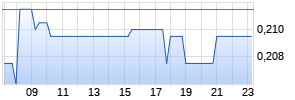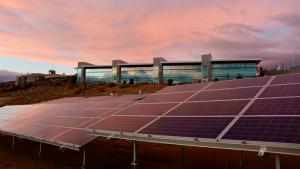Top-News

Montag,
05.09.2016 14:40
von
IRW-Press
| Aufrufe: 138
Berkeley Energia Ltd.: Hochgradige Abschnitte unterhalb von Zona 7 weisen auf Ressourcenhochstufung hin
Zwei Frauen beim Shopping (Symbolbild).
© filadendron / E+ / Getty Images
Hochgradige Abschnitte unterhalb von Zona 7 weisen auf Ressourcenhochstufung hin
Unterhalb der Lagerstätte Zona 7 wurden weitere hochgradige Abschnitte entdeckt, was frühere Hinweise unterstützt, wonach die Mineralisierung unterhalb der zurzeit definierten Ressource weiterverläuft.
Die Ergebnisse von weiteren vier Bohrlöchern, die in der oberflächennahen Lagerstätte Zona 7 gebohrt und auf eine maximale Tiefe von 271 Metern erweitert wurden, lieferten gemeldete Gehalte, die mit dem Durchschnittsgehalt der Ressource Zona 7 übereinstimmen oder höher waren.
Die herausragenden Abschnitte beinhalten:
- 14 m mit 1.776 ppm U3O8
- einschl. 8 m mit 2.644 ppm U3O8
- 26 m mit 1.103 ppm U3O8
- einschl. 4 m mit 3.973 ppm U3O8
- 10 m mit 635 ppm U3O8
- einschl. 1 m mit 2.246 ppm U3O1
- 14 m mit 597 ppm U3O8
- einschl. 8 m mit 1.204 ppm U3O2
- 17 m mit 563 ppm U3O8
- einschl. 2 m mit 1.160 ppm U3O8
Die Bohrungen bei Zona 7 sind Teil des laufenden Explorationsprogramms bei zahlreichen wichtigen Zielen beim Projekt Salamanca.
Die Bohrungen unterhalb von Zona 7 vervollständigen die drei Bohrlöcher, die in diesem Jahr gebohrt wurden und in denen hochgradige Abschnitte von bis zu 14 Metern mit 4.481 Teilen pro Million U3O8 gemeldet wurden (siehe Meldung vom 27. Januar 2016).
Managing Director Paul Atherley sagte:
Angesichts der vorübergehenden Auswirkung, die die oberflächennahe, hochgradige Lagerstätte Zona 7 auf die Wirtschaftlichkeit des Projektes hatte, wird das Hauptaugenmerk des aktuellen Explorationsprogramms darauf gerichtet werden, mehr davon zu finden. Weitere hochgradige Abschnitte unmittelbar unterhalb von Zona 7 sind äußerst vielversprechend und weisen auf eine potenzielle Ressourcenhochstufung bei der Lagerstätte hin.
Für weitere Informationen kontaktieren Sie bitte:
Paul Atherley-
Managing Director-
+44 207 478 3900-
info@berkeleyenergia.com
Hugo Schumann
Commercial Manager
+44 207 478 3900
Anhang A: Detaillierte Ergebnisse
Bohrprogramm
Im Rahmen des Programms, das ursprünglich konzipiert worden war, um eine Mineralisierung unterhalb und südlich von Zona 7 zu suchen und um eine Reihe von Zielen innerhalb eines Radius von zehn Kilometern der geplanten Retortillo-Anlage zu erproben, wurden bis dato 83 RC-Bohrlöcher auf insgesamt 5.900 Metern abgeschlossen.
Der Großteil der Bohrlöcher wurde in Abständen von 50 Metern entlang eines Abschnitts gebohrt, wobei zwischen den Abschnitten ein Abstand von 400 Metern eingehalten wurde.
Die Analysedaten von vier der abgeschlossenen Bohrlöcher sind eingetroffen. Ein Teil der Ergebnisse ist hierin angegeben, die restlichen Ergebnisse werden veröffentlicht, sobald sie verfügbar sind.
In den kommenden zwei Monaten werden acht weitere Bohrlöcher abgeschlossen werden, die allesamt die Mineralisierung unterhalb der Lagerstätte Zona 7 anpeilen. Die Ergebnisse werden gemeldet, sobald sie verfügbar sind.
Das Bohrprogramm ist Teil einer Strategie zur Aufrechterhaltung der jährlichen Produktion beim Projekt Salamanca von über vier Millionen Pfund, die erzielt werden wird, indem manche der 29,6 Millionen Pfund der bestehenden abgeleiteten Ressourcen in den Minenplan aufgenommen werden, die Ressource bei Zona 7 erweitert wird und neue Entdeckungen in der Region gemacht werden.
Ergebnisse
Die hierin gemeldeten Bohrlöcher wurden durch die oberflächennahe Lagerstätte Zona 7 gebohrt und auf eine maximale Bohrlochtiefe von 271 Metern erweitert. Die Untersuchungsergebnisse bestätigen das Vorkommen von Zonen mit hochgradigen Mineralisierungen unterhalb von Zona 7 (Abbildung 1).
Bei Zona 7 wurden in Oberflächennähe und in der Tiefe (zwischen drei und der maximalen Tiefe von 255 Metern) bedeutsame hochgradige Abschnitte mit Mächtigkeiten von bis zu 26 Metern verzeichnet. Ausgewählte Abschnitte beinhalten:
Bohrlochnr.Tiefenabschnitt Von Tiefe
(Bohrlochti
efe)
Z7R-357 10 m mit 635 ppm U3O30 m
8 39 m
43 m
einschl. 1 m mit 43 m
2.246 ppm 248 m
U 254 m
3O8
26 m mit 1.103 ppm U
3
O8
einschl. 4 m mit
3.973 ppm
U
3O8
2 m mit 461 ppm U3O8
1 m mit 762 ppm U3O8
Z7R-358* 5 m mit 526 ppm U3O848 m
Z7R-359* 10 m mit 494 ppm U3O47 m
8
Z7R-360 14 m mit 597 ppm U3O12 m
8 29 m
39 m
6 m mit 457 ppm U3O863 m
4 m mit 639 ppm U3O866 m
17 m mit 563 ppm U3O113 m
8 207 m
212 m
einschl. 2 m mit
1.160 ppm
U
3O8
6 m mit 480 ppm U3O8
14 m mit 1.776 ppm U
3
O8
einschl. 8 m mit
2.644 ppm
U
3O8
- * Bohrlöcher, die die angepeilte Tiefe aufgrund schwieriger Bodenbedingungen nicht erreicht haben und aufgegeben wurden
Alle bedeutsamen Abschnitte der abgeschlossenen Bohrungen sowie die Details zur Position des Bohrkragens, zur Bohrlochausrichtung und zur Tiefe sind in Anhang B zusammengefasst.
Geologische Beschaffenheit
Zona 7 ist eine erzgangartige Lagerstätte, die sich in einer Reihe feinkörniger Metasedimente befindet, die unterhalb einer Konglomerateinheit und neben einer Granitintrusion liegt (Abbildungen 1, 2 und 3). Die mineralisierte Hülle ist im Allgemeinen subhorizontal und die Mineralisierung ist in einem Erzgang-Stockwork enthalten. Die Uranmineralisierung kommt sowohl in der partiell verwitterten Zone als auch in frischem Gestein vor. In der südlichen Erweiterung variiert die Deckschicht aus dem Känozoikum zwischen einem und zwölf Metern.
http://www.irw-press.at/prcom/images/messages/2016/37634/160905 High grade intercepts below Zona 7 point to resource upgrade_fina _DE_PRCOM.001.png
http://www.irw-press.at/prcom/images/messages/2016/37634/160905 High grade intercepts below Zona 7 point to resource upgrade_fina _DE_PRCOM.002.png
Frühere Tiefenbohrlöcher
Abbildung 1: Bohrplan
http://www.irw-press.at/prcom/images/messages/2016/37634/160905 High grade intercepts below Zona 7 point to resource upgrade_fina _DE_PRCOM.003.png
http://www.irw-press.at/prcom/images/messages/2016/37634/160905 High grade intercepts below Zona 7 point to resource upgrade_fina _DE_PRCOM.004.png
Frühere RC-Bohrlöcher
Abbildung 2: Zona 7 Querschnitt A
http://www.irw-press.at/prcom/images/messages/2016/37634/160905 High grade intercepts below Zona 7 point to resource upgrade_fina _DE_PRCOM.005.png
http://www.irw-press.at/prcom/images/messages/2016/37634/160905 High grade intercepts below Zona 7 point to resource upgrade_fina _DE_PRCOM.006.png
Frühere RC-Bohrlöcher
Abbildung 3: Zona 7 Querschnitt B
Erklärung der Competent Persons
Die Informationen in dieser Meldung, die sich auf Explorationsergebnisse von Zona 7 beziehen, basieren auf Informationen von Malcolm Titley, einer Competent Person und eines Mitglieds des Australasian Institute of Mining and Metallurgy. Herr Titley ist ein Angestellter von Maja Mining Limited, einem unabhängigen Beratungsunternehmen. Herr Titley verfügt über ausreichende Erfahrung, die für diese Art von Mineralisierung und Lagerstätte sowie für seine Tätigkeiten erforderlich ist, um als Competent Person gemäß der Ausgabe von 2012 des Australasian Code for Reporting of Exploration Results, Mineral Resources and Ore Reserves definiert werden zu können. Herr Titley erlaubt das Hinzufügen von Material zu diesem Bericht, das auf seinen Informationen basiert und in Form und Kontext erscheint.
Die Daten in dieser Meldung, die sich auf die Mineralressourcen beziehen, stammen von der Meldung vom 14. Juli 2016 mit dem Titel Study confirms the Salamanca project as one of the worlds lowest cost uranium producers, die auf der Website von Berkeley Energia Limited (Berkeley) unter www.berkeleyenergia.com verfügbar ist.
Berkeley bestätigt, dass a) ihm keine neuen oder andere Daten vorliegen, die sich erheblich auf die in der
ursprünglichen Pressemitteilung angegebenen Daten auswirken; b) alle Materialannahmen und technischen Parameter hinsichtlich der Mineralressourcen, die in der ursprünglichen Meldung enthalten sind, nach wie vor gelten und sich nicht erheblich geändert haben; und c) die Form und der Kontext, in denen die Ergebnisse der entsprechenden Competent Persons in dieser Meldung dargestellt werden, gegenüber den ursprünglichen Meldungen nicht erheblich geändert wurden.
Die Daten in der ursprünglichen Meldung, die sich auf die Mineralressourcen beziehen, basieren auf Informationen von Malcolm Titley, einer Competent Person und eines Mitglieds des Australasian Institute of Mining and Metallurgy. Herr Titley ist ein Angestellter von Maja Mining Limited, einem unabhängigen Beratungsunternehmen. Herr Titley verfügt über ausreichende Erfahrung, die für diese Art von Mineralisierung und Lagerstätte sowie für seine Tätigkeiten erforderlich ist, um als Competent Person gemäß der Ausgabe von 2012 des Australasian Code for Reporting of Exploration Results, Mineral Resources and Ore Reserves definiert werden zu können.
Zukunftsgerichtete Aussagen
Aussagen zu Plänen im Hinblick auf die Mineralkonzessionsgebiete Berkeley´s sind zukunftsgerichtete Aussagen. Es kann nicht gewährleistet werden, dass die Pläne Berkeley´s für die Erschließung seiner Konzessionsgebiete wie gegenwärtig erwartet umgesetzt werden können. Es kann zudem nicht garantiert werden, dass Berkely in der Lage sein wird, weitere Minerallagerstätten abzugrenzen, dass sich die Mineralisierung als wirtschaftlich erweisen wird oder dass in den Mineralkonzessionsgebieten Berkeley´s jemals eine Mine erschlossen werden wird.
Die Ausgangssprache (in der Regel Englisch), in der der Originaltext veröffentlicht wird, ist die offizielle, autorisierte und rechtsgültige Version. Diese Übersetzung wird zur besseren Verständigung mitgeliefert. Die deutschsprachige Fassung kann gekürzt oder zusammengefasst sein. Es wird keine Verantwortung oder Haftung: für den Inhalt, für die Richtigkeit, der Angemessenheit oder der Genauigkeit dieser Übersetzung übernommen. Aus Sicht des Übersetzers stellt die Meldung keine Kauf- oder Verkaufsempfehlung dar! Bitte beachten Sie die englische Originalmeldung auf www.sedar.com , www.sec.gov , www.asx.com.au/ oder auf der Firmenwebsite!
Appendix B
Summary of RC Drill Intersections- Zona 7 Deep
(200 ppm U3O8 cut-off)
Drill EastNorthElevatAzimuDiDept FroTo InteU3O8
Hole ing ing ion th p h m (m)rval (pp
ID m)
(m) (m) (m) (o) (o(m) (m) (m)
)
Z7R-35713945273755 360 -9271 30 40 10 635
7 55 76 0
in39 40 1 2,24
cl 6
.
43 69 26 1,10
3
in43 47 4 3,97
cl 3
.
in56 57 1 1,25
cl 6
.
in65 66 1 4,92
cl 8
.
88 89 1 264
2482502 461
2542551 762
Z7R-35714045273764 360 -997 38 40 2 539
8* 44 30 0
48 53 5 526
61 62 1 266
Z7R-35714045272766 360 -999 32 34 2 262
9* 55 81 0
39 41 2 312
47 57 10 494
in49 50 1 1,15
cl 4
.
91 92 1 433
Z7R-36713845271755 360 -9251 12 26 14 597
0 60 96 0
in17 19 2 1,20
cl 4
.
in24 25 1 1,11
cl 7
.
29 35 6 457
in32 33 1 1,21
cl 4
.
39 43 4 639
in42 43 1 1,48
cl 6
.
63 80 17 563
in66 68 2 1,16
cl 0
.
in70 71 1 1,61
cl 5
.
83 92 9 200
1131196 480
in1161171 1,26
cl 2
.
1281302 431
1361382 323
1411432 924
in1421431 1,38
cl 5
.
1571581 381
20722114 1,77
6
in2072103 1,00
cl 4
.
in2122208 2,64
cl 4
.
* drill holes failed to reach the target depth due to difficult ground conditions and were terminated
Appendix C: JORC Code, 2012 Edition - Table 1 report
Section 1 Sampling Techniques and Data
(Criteria in this section apply to all succeeding sections.)
CriteriJORC Code explanation Commentary
a
SamplinNature and quality of All results reported are from
g sampling Reverse Circulation (RC)
techni ( drill samples collected over
ques eg cut channels, random one metre (1m) intervals.
chips, or specific Multiple methods were used to
specialised industry determine uranium
standard measurement mineralisation intervals
tools appropriate to the including down hole gamma
minerals under analysis, hand held
investigation, such as
down scintillometer measurements
and portable XRF analysis.
hole gamma sondes, or Intervals containing uranium
handheld XRF instruments, mineralisation were selected
and submitted for laboratory
etc). These examples assay
should not be taken as analysis.
limiting the broad
meaning of
sampling.
Include reference to Standards and blanks are
measures taken to ensure inserted into the sample
sample stream to assess the
accuracy, precision and
representivity and the methodology of the external
appropriate calibration laboratories used. In
of any measurement tools addition, field duplicate
or systems samples are inserted to
used. assess the variability of the
uranium mineralisation.
Approximately 15-20% of all
samples relate to quality
control. In addition, the
laboratories undertake their
own duplicate sampling as
part of their internal QA/QC
processes. Examination of the
QA/QC sample data indicates
satisfactory performance of
field sampling protocols and
assay laboratories providing
acceptable levels of
precision and
accuracy.
Drill hole collar locations
are surveyed by qualified
surveyors
(
Cubica Ingeniería Metrica S.L)
using standard differential
GPS
(DGPS) equipment achieving sub
decimetre accuracy in
horizontal and vertical
position. Down-hole surveys
are undertaken using a
Geovista down-hole deviation
probe. Measurements are taken
every 1cm down hole and
averaged every 10m. No
strongly magnetic rocks are
present within the deposit
which may affect magnetic
based
readings.
Aspects of the RC drill samples are collected
determination of over 1m intervals, manually
mineralisation that are homogenised before being
Material to the Public split on site using a three
Report. In cases where tier riffle splitter to
industry standard work provide an approximate 3-5kg
has been done this would sample. In rare cases, wet
be relatively simple samples are split using a
( cone and quarter
eg reverse circulation method.
drilling was used to
obtain 1 m samples from
which 3 kg was pulverised Scintillometer measurements
to produce a 30 g charge are taken on all samples and
for fire assay). In this data is used to select
other cases more the samples to be sent to
explanation may be external laboratories for
required, such as where sample preparation and
there is coarse gold that analysis. Indicative
has inherent sampling mineralised intervals are
problems. Unusual determined from this data and
commodities or the sampling extended up and
mineralisation types down hole by at least 2-5m.
(
eg submarine nodules) may
warrant disclosure of
detailed Samples are further split in
information. the core shed using a scoop
such that 0.7-1kg samples are
sent to the preparation
laboratories of ALS (Seville,
Spain) and analytical
laboratory of ALS
(
Loughrea, Ireland). Samples
are dried, fine crushed down
to 70% below 2mm, split to
obtain 250g and pulverised
with at least 85% of the
sample passing 75µm. 10g of
sample is used for uranium
analysis by pressed powder
X-ray fluorescence (XRF)
method.
DrillinDrill type (eg core, Drilling was by the RC method
g reverse circulation, drilling using a 140mm
techni open-hole hammer, rotary diameter face sampling
ques air blast, auger, Bangka, hammer.
sonic,
etc) and details (eg core
diameter, triple or
standard tube, depth of
diamond tails,
face-sampling bit or
other type, whether core
is oriented and if so, by
what method,
etc).
Drill Method of recording and RC drill samples are collected
sample assessing core and chip over 1m intervals through a
recove sample recoveries and cyclone. Plastic sample bags
ry results are strapped to the cyclone
assessed. to maximise sample recovery.
Individual sample bags are
not weighed to assess sample
recovery but a visual
inspection is made by the
Company geologist to ensure
all samples are of
approximately equivalent
size.
Measures taken to maximise The RC drilling rigs utilised
sample recovery and suitably sized compressors to
ensure representative ensure dry samples where
nature of the possible. Plastic sample bags
samples. are strapped to the cyclone
to maximise sample recovery.
Sample logs record whether
the sample is dry, moist or
wet.
Whether a relationship There is no known relationship
exists between sample between sample recovery and
recovery and grade and grade. The RC sample
whether sample bias may recoveries are of an
have occurred due to acceptable level and no bias
preferential loss/gain of is expected from any sample
fine/coarse losses.
material.
LoggingWhether core and chip Geological logging of RC chip
samples have been samples includes recording
geologically and descriptions of lithology,
weathering, alteration and
geotechnically logged to a mineralisation. A
level of detail to
support appropriate scintillometer reading of
Mineral Resource counts per second (cps) is
estimation, mining recorded for each 1m sample
studies and metallurgical (quantitative).
studies.
Whether logging is Geological logging is
qualitative or qualitative in nature. RC
quantitative in nature. samples and chip trays are
Core (or photographed.
costean, channel, etc)
photography.
The total length and All RC drill holes are logged
percentage of the in full by Company
relevant intersections geologists.
logged.
Sub-samIf core, whether cut or Not Applicable - RC drilling
pling sawn and whether quarter, only.
techni half or all core
ques taken.
and If non-core, whether RC drill samples are collected
sample riffled, tube sampled, at 1m intervals. RC intervals
prepar rotary split, are sampled by splitting dry
ation samples in the field to 3-5kg
etc and whether sampled using a three tier riffle
wet or splitter and further split in
dry. the core shed to 0.7-1kg
using a scoop. Where samples
are wet they are dried prior
to spitting. In rare cases,
wet samples are split using a
cone and quarter
method.
For all sample types, the Samples are sent to ALS
nature, quality and laboratories for preparation.
appropriateness of the Samples are dried, fine
sample preparation crushed down to 70% below 2mm
technique. and pulverised with at least
85% of the sample passing
75µm. 10g of sample is used
for uranium analysis by
pressed powder XRF method.
This is considered
appropriate for this style of
uranium
mineralisation.
Quality control procedures Previous field tests have
adopted for all determined that the sample
sub-sampling stages to size and method of sampling
maximise produce representative RC
samples. QA/QC procedures
representivity of samples. involve the use of standards,
duplicates and blanks which
are inserted into sample
batches at a frequency of
approximately
15-20%.
Measures taken to ensure Duplicate splits of RC samples
that the sampling is are taken every 10m down hole
representative of the in within the sampled intervals.
situ material collected, The results from these
including for instance duplicates generally show
results for field acceptable
duplicate/second-half repeatability.
sampling.
Whether sample sizes are The uranium is typically very
appropriate to the grain fine grained. Previous test
size of work carried
the material being sampled.out by Berkeley using
different sample sizes has
demonstrated that the
selected sample size is
appropriate.
QualityThe nature, quality and Uranium analysis by pressed
of appropriateness of the powder XRF method. This
assay assaying and laboratory analytical method reports
data procedures used and total uranium
and whether the technique is content.
labora considered partial or
tory total.
tests
For geophysical tools, Down-hole gamma logging is
spectrometers, handheld undertaken for all probe
XRF instruments, accessible drill holes to
provide
etc, the parameters used eU
in determining the 3O8 (equivalent U3O8 grade)
analysis including data however, it is not
instrument make and currently considered of
model, reading times, sufficient quality to replace
calibrations factors chemical assay data for the
applied and their purposes of reporting
derivation, drilling results at
etc.
Zona 7. The drill
intersections reported in
this release are calculated
using only chemical assay
data.
Nature of quality control Standards, blanks and
procedures adopted duplicates are regularly
( inserted into the sample
eg standards, blanks, stream with approximately
duplicates, external 15-20% of all samples related
laboratory checks) and to quality control. The
whether acceptable levels external laboratories used
of accuracy also maintain their own
( process of QA/QC utilising
ie lack of bias) and standards, pulp repeats,
precision have been sample duplicates and
established. blanks.
Review of the Berkeley quality
control samples, as well as
the external laboratory
quality QA/QC reports, has
shown no sample preparation
issues, acceptable levels of
accuracy and precision and no
bias in the analytical
datasets.
VerificThe verification of Reported significant
ation significant intersections intersections have been
of by either independent or checked and verified by
sampli alternative company Senior Geological management.
ng and personnel.
assayi
ng
The use of twinned holes. No twinned holes were drilled
in the current RC drilling
program.
Documentation of primary All primary data is recorded
data, data entry in templates designed by
procedures, data Berkeley. Assay data from the
verification, data external laboratory is
storage (physical and received in spreadsheets and
electronic) downloaded directly into an
protocols. Access Database managed by
the Company. Data is entered
into controlled excel
templates for validation. The
validated data is then loaded
into a password secured
relational database by a
designated Company geologist.
Daily backups of all digital
data are undertaken. These
procedures are documented in
the Berkeley Technical
Procedures and Protocols
manual.
Discuss any adjustment to Uranium (ppm) assays received
assay from the external laboratory
data. are converted to
U
3O8 (ppm) using the
stoichiometric factor of
1.179.
LocatioAccuracy and quality of Drill hole collar locations
n of surveys used to locate are surveyed by qualified
data drill holes (collar and surveyors
points down-hole surveys), (
trenches, mine workings Cubica Ingeniería Metrica S.L)
and other locations used using standard differential
in Mineral Resource GPS (DGPS) equipment
estimation. achieving sub decimetre
accuracy in horizontal and
vertical position.
Down-hole surveys are
undertaken using a
Geovista down-hole deviation
probe. Measurements are taken
every 1cm down hole and
averaged every 10m. No
strongly magnetic rocks are
present within the deposit
which may affect magnetic
based readings.
Specification of the grid The grid system is ETRS 1989
system UTM Zone
used. 29N.
Quality and adequacy of Topographic control is based
topographic on a digital terrain model
control. with sub metric accuracy
sourced from the Spanish
Geographical Institute
(
Instituto Geográfico Nacional)
and is verified through
detailed drill
hole collar surveys by a
qualified surveyor using a
DGPS.
Data Data spacing for reporting This RC drilling program has
spacin of Exploration been designed to cross
g and Results. significant mineralization.
distri
bution
Whether the data spacing The data spacing is not
and distribution is considered sufficient to
sufficient to establish assume geological and grade
the degree of geological continuity, and will not
and grade continuity allow the estimation of
appropriate for the Mineral Resources on
Mineral Resource and Ore deep.
Reserve estimation
procedure(s) and
classifications
applied.
Whether sample compositing No compositing of RC samples
has been in the field has been
applied. undertaken.
OrientaWhether the orientation of Shallow parts of the deposit
tion sampling achieves show that the mineralised
of unbiased sampling of zone strikes
data possible structures and northeast-southwest and is
in the extent to which this interpreted to be
relati is known, considering the sub-horizontal (due to post
on to deposit mineralisation supergene
geolog type. processes) to shallowly
ical dipping.
struct
ure
If the relationship All of the RC drill holes
between the drilling reported in this release are
orientation and the vertical. Due to the
orientation of key interpreted flat lying nature
mineralised structures is of the mineralisation, no
considered to have sampling bias is considered
introduced a sampling to have been introduced by
bias, this should be the orientation of the
assessed and reported if drilling.
material.
Sample The measures taken to Chain of custody is managed by
securit ensure sample Berkeley. Samples are
y security. transported
from the drill site by Company
vehicle to a sample
preparation shed where
samples are prepared for
dispatch. Samples are sent
directly from the sample
preparation shed to the
laboratory using a certified
courier or a Berkeley owned
vehicle authorised for
radioactive materials
transport. No other freight
is transported with the
samples which are taken
directly from the Berkeley
facility to the external
laboratory. Sample submission
forms are sent in paper form
with the samples as well as
electronically to the
laboratory. Reconciliation of
samples occurs prior to
commencement of sample
preparation for
assaying.
Audits The results of any audits Sampling techniques and
or or reviews of sampling procedures, as well as QA/QC
review techniques and data, are reviewed internally
s data. an ongoing basis. Mr Malcolm
Titley (Geology Consultant,
Maja Mining Limited) has
independently reviewed the
sampling techniques,
procedures and data. He has
undertaken a site visit to
review and inspect the
application of procedures.
These reviews have concluded
that the sampling and
analytical results have
resulted in data suitable for
incorporation into Mineral
Resource
estimation.
Section 2 Reporting of Exploration Results
(Criteria listed in the preceding section also apply to this section.)
CriteriJORC Code explanation Commentary
a
Mineral Type, reference The Zona 7 Prospect lies on
tenemen name/number, location the
t and and ownership including
land agreements or material Alisos Investigation Permit PI
tenure issues with third 6605-20 which is 100% owned
status parties such as joint by
ventures, partnerships,
overriding royalties, Minera de Río Alagón, a wholly
native title interests, owned subsidiary of Berkeley
historical sites,
wilderness or national Energia Limited.
park and environmental
settings. The Alisos Investigation
Permit is currently in the
first year of its third three
year term and will expire on
5 January
2017.
No historical sites,
wilderness or national parks
are located within the
Permit. The
Zona 7 Prospect is located
adjacent to the village of
Villavieja de Yeltes.
The security of the Tenure in the form of an
tenure held at the time Investigation Permit has been
of reporting along with granted and is considered
any known impediments to secure. There are no known
obtaining a licence to impediments to obtaining a
operate in the licence to operate in this
area. area.
ExploratAcknowledgment and Previous exploration at Zona 7
ion appraisal of exploration was completed initially by
done by other Junta de
by parties.
other Energía Nuclear (JEN) and then
parties Empresa
Nacional de Uranio S.A.
(ENUSA), both Spanish state
run companies, from the late
1950's through to the mid
1980's. Work completed by JEN
and ENUSA included mapping,
radiometric surveys,
trenching and diamond (DD)
and open-hole (OH)
drilling.
A detailed data assessment and
verification of the historic
data supplied by ENUSA has
been undertaken. No
significant issues with the
data were
detected.
Geology Deposit type, geological The uranium mineralisation is
setting and style of hosted within Lower Cambrian
mineralisation.
metasediments adjacent to
granite. The mineralisation
typically occurs as a
sub-horizontal to shallowly
dipping layer occurring
between surface and 100m
depth, although
mineralisation has been
recorded to a maximum depth
of 255m in the current RC
holes. The style of the
uranium mineralisation
includes veins,
stockwork and disseminated
mineralisation in
joint/fracture filling
associated with brittle
deformation.
Uraninite and coffinite are
the primary uranium minerals.
Secondary uranium
mineralisation is developed
in "supergene-like" tabular
zones corresponding to the
depth of weathering. Most of
the mineralisation is hosted
within partially weathered
and
unweathered metasediment. This
deposit falls into the
category defined by the
International Atomic Energy
Association (IAEA) as Vein
Type, Sub Type Iberian
Type.
Werbung
Mehr Nachrichten zur Berkeley Energia Aktie kostenlos abonnieren
E-Mail-Adresse
Bitte überprüfe deine die E-Mail-Adresse.
Benachrichtigungen von ARIVA.DE
(Mit der Bestellung akzeptierst du die Datenschutzhinweise)
(Mit der Bestellung akzeptierst du die Datenschutzhinweise)
-1

Vielen Dank, dass du dich für unseren Newsletter angemeldet hast. Du erhältst in Kürze eine E-Mail mit einem Aktivierungslink.
Hinweis: ARIVA.DE veröffentlicht in dieser Rubrik Analysen, Kolumnen und Nachrichten aus verschiedenen Quellen. Die ARIVA.DE AG ist nicht verantwortlich für Inhalte, die erkennbar von Dritten in den „News“-Bereich dieser Webseite eingestellt worden sind, und macht sich diese nicht zu Eigen. Diese Inhalte sind insbesondere durch eine entsprechende „von“-Kennzeichnung unterhalb der Artikelüberschrift und/oder durch den Link „Um den vollständigen Artikel zu lesen, klicken Sie bitte hier.“ erkennbar; verantwortlich für diese Inhalte ist allein der genannte Dritte.



